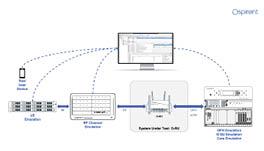12 September 2023

NI and Spirent Communications have announced the first and only O-RU (Radio Unit) test solution that uses application layer testing with any commercial device, providing comprehensive, real-time O-RU validation. This unique capability enables customers to validate their systems faster and in a real-world environment while reducing costs - all in one validation solution.
Traditional testing of O-RAN systems has been very time-intensive and cost-prohibitive due to the need for engineers to manually test their systems from beginning to end. Built on common technologies, the Spirent/NI joint solution combines Spirent’s software and emulation environment, including pre-built test cases, with NI’s high-performance instrumentation, providing a robust and integrated O-RU validation solution that improves time to market with full automation through a single, intuitive GUI while also minimizing instrument cost and footprint.
The solution wraps the O-RU with a real-time O-DU emulator through a fully compliant O-RAN 7.2 interface, a CU emulator, a core network emulator, and a commercial UE emulator for real-world interoperability testing (IOT) to deliver a testbed capable of running real-world test scenarios in the lab. Customers can also use a commercial device in place of the UE emulator to validate all timing, full throughput including 4x4 MIMO, and any system-level test that an O-RU would experience in a real-world deployment scenario to test true performance and interoperability at a functional level rather than at the interface. On the production side, NI also has an O-RAN O-RU APT test system which uses the same O-DU emulation and combines this with NI’s PXIe-5841 VST for parametric measurements for best-in-class efficiency with unmatched measurement accuracy.
This test system is highly configurable, real-time, and ORAN FH compliant. It enables customers to configure the O-DU to emulate various timing profiles, test corner cases, and validate the system performance under real-time conditions. In addition, having the same test systems used in validation facilitates a streamlined O-RU development process that connects validation to production and drastically reduces test time, cost, and development effort.







